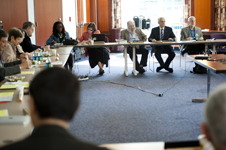
The Faculty Senate met on Wednesday, when Senior Vice President and General Counsel Ralph Martin discussed the process to develop a new Institutional Master Plan. Photo by Christopher Huang.
Northeastern is at the start of a “once-in-a-generation opportunity” to define its future with a new Institutional Master Plan, the first in more than a decade, said Ralph Martin, Northeastern’s senior vice president and general counsel, in a briefing yesterday to the Faculty Senate.
“We are a very diverse university, and one of the things that could distinguish this master plan from the previous plan — which was very residence-focused, taking us out of the realm of a commuter school — is now that the academic and research elements have really increased, we have to take a look at the kind of spaces we need to support those functions: labs, classrooms, conference and meeting spaces — you name it,” Martin said.
Northeastern’s leadership will work closely with faculty, staff, alumni and others, alongside a task force of 15 to 20 members of the surrounding community, to develop the master plan, which is due to the city of Boston by the end of 2012.
The master plan will draw heavily from Northeastern’s Academic Plan and Long-Range Plan, “documents that should inform our contemplative uses and ultimately be a major driver in what the master plan produces,” Martin said.
Though the city’s planning requirements only call for an outlook of Northeastern’s use of land within Boston, Martin said the process could also serve as a way to determine how to best use other University-owned property, which includes campuses in Burlington, Nahant and Dedham.
Northeastern is in the process of completing some of the final projects outlined in the 2000 master plan and subsequent amendments, including the leasing of a research building at 140 Fenway and the construction of a new residence hall behind the YMCA property near Matthews Arena.
Louis J. Kruger, chairman of the Senate Agenda Committee, said he appreciated that the faculty was being included in the process “from the ground floor” and would be included on planning committees.
“This is an ongoing process, and I hope that you will participate in all the opportunities to inform and engage,” said Provost Stephen Director. “Think about how instruction is going to be carried out in the next 10 to 15 years — is it still going to be the faculty standing out in front of the classroom or will it be more in studios and labs? As we look at the teaching spaces, it is the faculty we’re going to be turning to.”
Northeastern University’s College of Professional Studies (CPS) is committed to providing career-focused educational programs that are designed to accommodate the complex lives of motivated learners. Offered in a variety of innovative formats, CPS courses are taught by accomplished scholars and practitioners who have real-world experience. The result is an educational experience founded on proven scholarship, strengthened with practical application, and sustained by academic excellence.
Northeastern University is a global university with a tradition of partnership and engagement that creates an innovative, distinctive approach to education and research. Northeastern integrates classroom studies with experiential learning opportunities in 70 countries, and pursues use-inspired research with a focus on global challenges in health, security, and sustainability.